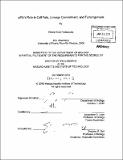pRb's role in cell fate, lineage commitment, and tumorigenesis
Author(s)
Calo-Velázquez, Eliezer
DownloadFull printable version (17.85Mb)
Alternative title
Retinoblastoma Protein's role in cell fate, lineage commitment, and tumorigenesis
Other Contributors
Massachusetts Institute of Technology. Dept. of Biology.
Advisor
Jacqueline A. Lees.
Terms of use
Metadata
Show full item recordAbstract
The product of the retinoblastoma gene, pRB, was the first known and cloned tumor suppressor gene and it is functionally inactivated in most human cancers. pRB is thought to suppresses tumorigenesis by restraining cellular proliferation. pRB binds to the E2F family of transcription factors and prevents them from activating genes require for cell cycle progression. In addition, pRB modulates cellular differentiation by binding to master differentiation inducers to either enhance or repress their transcriptional activity. While most of pRB's tumor suppressive functions have been studied in the context of cell cycle control, little is known as to whether pRB's role in differentiation also influences tumorigenesis. We have addressed this issue in the context of bone sarcomas, a tumor type in which pRB is frequently inactivated. To model osteosarcoma in the mouse we used a targeted conditional approach in which Rb and/or p53 were deleted in pre-osteoblasts or mesenchymal stem cells. In osteoblasts we found that Rb loss synergized strongly with p53-inactivation: it greatly accelerated tumor development and it expanded the tumor spectrum from osteosarcoma in the p53 single mutants to multiple soft tissue sarcomas in the Rb;p53 DKO. In mesenchymal stem cells we found that Rb acted in a dose dependent manner to modulate the spectrum of tumors arising from p53-deficient, mesenchymal stem cells: osteosarcomas predominated in the presence of Rb, while Rb loss strongly favored brown fat tumors. Thus, to directly address the influence of Rb status in mesenchymal tumorigenesis we used inducible systems to control pRB's expression. Our data showed that toggling between Rb loss or Rb re-activation was sufficient to switch the fate commitment of osteosarcoma tumor cells in vitro through direct regulation of transcription factors that control mesenchymal differentiation. Consistently, we found that reactivation of Rb in tumors generated from Rb;p53 DKO cells was sufficient to halt tumor progression by promoting differentiation of the tumor cells in vivo. Taken together, our data have uncovered three novel roles for pRb. First, Rb loss promotes tumorigenesis by deregulating the differentiation potential of committed pre-osteoblasts. Second, pRb regulates fate choice and lineage commitment between the bone and the fat lineages in vivo. Third, pRb suppresses tumorigenesis by enforcing cell cycle exit and terminal differentiation.
Description
Thesis (Ph. D.)--Massachusetts Institute of Technology, Dept. of Biology, February 2011. Cataloged from PDF version of thesis. Vita. Includes bibliographical references.
Date issued
2011Department
Massachusetts Institute of Technology. Department of BiologyPublisher
Massachusetts Institute of Technology
Keywords
Biology.